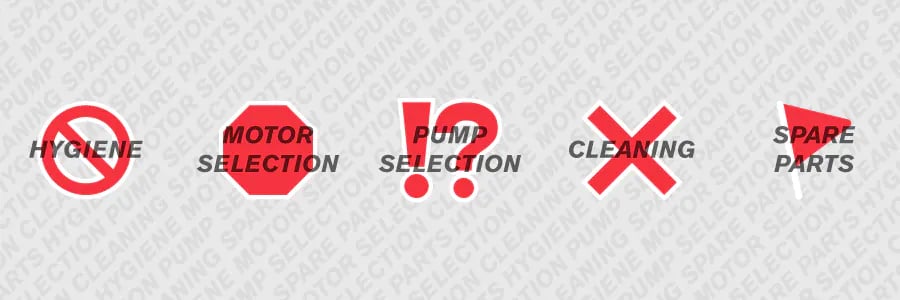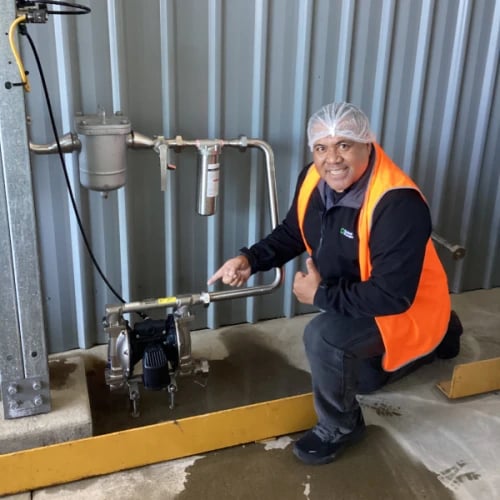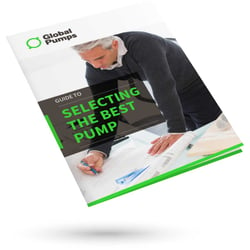Over the years, we've identified common challenges faced by the food and beverage industry in pump selection. Today, we'll spotlight five common mistakes companies make when choosing a food-grade pump, with insights from our team that has successfully addressed various pumping challenges.

1. Choosing the Incorrect Hygiene Grade:
Food-grade pumps have various hygiene standards. Selecting a grade that's either too high or too low can lead to unnecessary expenses or, worse, unsuitable hygiene that may result in food contamination.
Consider a meat processing plant that opts for a pump with a hygiene grade higher than necessary. This not only results in unnecessary expenses but also complicates maintenance procedures. On the flip side, a lower hygiene grade in a dairy processing facility could lead to contamination risks. Striking the right balance, such as meeting Australian Meat Grade standards, is vital for ensuring product integrity and regulatory compliance.
2. Incorrect Motor Selection:
In hazardous areas, failing to choose an explosion-proof motor can lead to catastrophic failures and pose risks to workers. This is very prevalent in the distilling industry when using ethanol.
Imagine if a brewery inadvertently overlooks the use of explosion-proof motors when handling ethanol—it could lead to significant challenges. Without a food grade ethanol pump with these crucial safety features, there's a potential for serious danger, possibly prompting the brewery to halt production due to the risk of a fire sparked by a minor ignition.
In this hypothetical scenario, the choice of a pump without the necessary safety features for handling hazardous liquids becomes a critical consideration. This is particularly paramount in industries like beverage production, where the liquids involved can pose inherent dangers, such as in the distilling process.
3. Choosing the Wrong Pump for the Application:
Pump selection should take into account the properties of the fluid being pumped, including viscosity, shear sensitivity, and heat. Understanding these factors is crucial for determining the appropriate pump type. Not having the correct food-grade pump can result in frustrating reliability issues and costly downtime.
Global Pumps makes sure to completely understand your application to recommend potential solutions.
For example, this photo has our team member Jerry Brown next to our Verderair VA25 Stainless Steel Air Operated Diaphragm Pump installed at Australian Vinegar, required for the bottling machine specifically designed to handle the viscosity of their balsamic vinegar.
The pump has not missed a beat since installation. One less challenge for Australian Vinegar to worry about, allowing them to focus on what they need to without concern.
4. Neglecting the Cleaning Process:
Overlooking the cleaning process can lead to the inclusion of improper materials in the pump design. This may result in rapid seal failures or unnecessary and costly plant downtime.
For instance, a company in the sauce production industry that underestimates the importance of the cleaning process when selecting pumps may choose pumps that are not designed to withstand the cleaning agents used in the facility, leading to rapid seal failures and increased downtime due to frequent maintenance.
Selecting the correct type of hygienic pump for food processing helps to properly account for the cleaning process and ensure the longevity of pump components in food-grade applications.
5. Spare Parts Considerations:
Opting for cheaper systems from overseas without accounting for spare parts availability can lead to significant delays or the need to purchase an entirely new pump. Sometimes, a critical component can fail, causing significant delays and financial losses. Choosing a locally available pump initially provides the advantage of local support throughout the life of your plant.
Uncertain about which pump suits your food application?
If you need a pump specialist to help determine the right pumping solution for your food processing, don't hesitate to get in touch with us.
Additionally, explore our recent case studies to see what solutions other food and beverage companies have implemented in their processes.
Check out our Packo to discover more about our food-grade product range.

